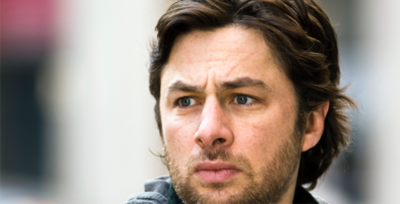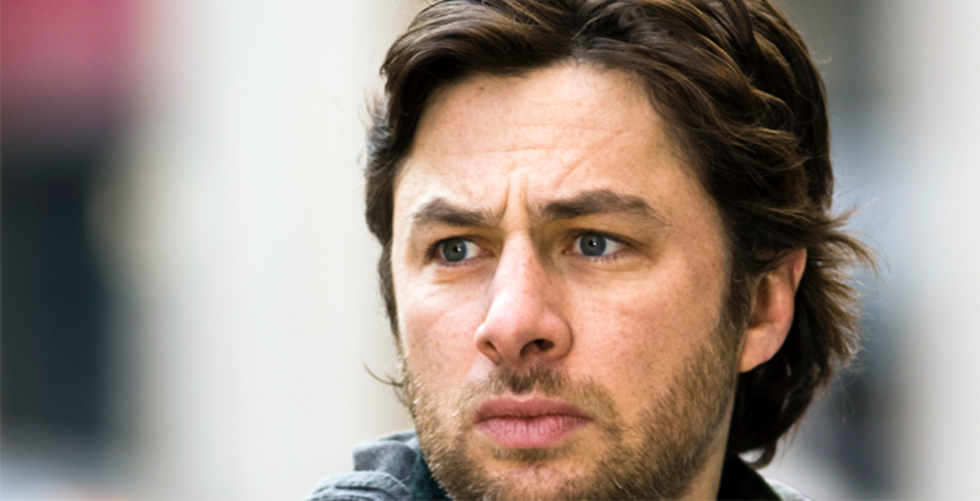
BY KRISTIN MC CRACKEN |
Deborah Chow: High Cost of Living
The Canadian director explores a darker side of love in Montreal with Zach Braff and Isabelle Blais. At Tribeca Cinemas Friday, September 9.

Note: This interview originally ran in March 2011.
The High Cost of Living will screen daily at 3:30 pm at Tribeca Cinemas from September 9-15. Tickets go on sale August 30.

Tribeca: Tell us about The High Cost of Living.
Deborah Chow: I describe the film as a dark love story. It’s really about two people who meet under circumstances that are very intense, after a car accident. It’s about trust, and trying to live authentically, and what that means and all the choices that entails.
Tribeca: Where did the inspiration for the story come from?
Deborah Chow: Fortunately, given the story, nothing is from my real life. [laughs] Otherwise I’d be in deep trouble. But it was a variety of things—I worked on the script for a long time; it was in development for five years. It evolved from where it started to where it ended. There wasn’t one good inspiration, because where we ended was so different from where we started. But I would say there were two main inspirations: the first was Montreal. I started with the city, and I knew that I wanted to shoot there.
Tribeca: Are you from Montreal?
Deborah Chow: No, I’m originally from Toronto. But I had gone to school in Montreal and I’d always loved the city. I always thought it would be such a great place to make a film. So I knew that was the city, and that I would use the languages there [as part of the story]—the French and the English.
And the second thing is that when I first started the script, my sister had just become pregnant. And it was amazing to watch her go through that experience—how many people would come up and try and touch her stomach. So I started thinking about the image of a pregnant woman, and how people expect her to behave.
Tribeca: Going back to your first inspiration, it’s interesting that there’s a language barrier built into the film, because we don’t really have that in the US—well, we do in New York—
Deborah Chow: [laughs] We do: Spanglish, of course.
Tribeca: Did you build that in from the beginning?
Deborah Chow: I knew the film would be in English, because my French is not strong enough; I’m obviously an Anglophone. But I was living in New York at the time, where I’d gone to film school, and I’d lived there for almost nine years. So I was writing a little bit nostalgically about the city that I’d lived in. And there just wasn’t a way to do a movie in Montreal that was Anglophone; it didn’t make sense. Because even if you went to get a taxi or into a grocery store, they would always speak French to you first. So there just was no way, so I said I should just build the setting, and that’s how it came about.

Tribeca: Did you have any lightning bolt moments during the shoot? Either good or bad?
Deborah Chow: We were actually pretty fortunate during the shooting. It wasn’t one of those monstrous, horrible stories. We shot really quickly; it was twenty days. And we were shooting in February, which we hadn’t originally intended. Everybody in Montreal calls that suicide month, because it’s so cold, it can literally get to minus twenty. So there was the weather, and trying to shoot in the middle of the night, with everyone wearing about 400 layers of clothing, and you could hardly see anyone because their hats were pulled down. But otherwise it was pretty smooth. There was nothing that went really wrong.
The snow was a positive, actually, but it was a little crazy because it was when we were supposed to shoot this scene on the rooftop when we were hit with a crazy snowstorm. And everybody’s running around, trying to get me to pull the scene. [laughs] “Cut the scene, cut the scene!” And I’m going, “You can’t cut this scene!”
And in certain ways it was the best thing that could have happened. The only thing that was a bit weird was that we were low-budget, so we had no continuity for the snow. We had to cut a few minor scenes, actually, because Zach [Braff] would be walking into his apartment and it wouldn’t be snowing, and three days later it would be snowing. Zach kept saying the entire time, “If I hear one more Canadian tell me it’s not cold, I’m going home!” [laughs]
Tribeca: What advice would you give to aspiring filmmakers?
Deborah Chow: It’s going to sound pretty obvious, but it took me five years to get here. And along the way, there was a time when I wanted to become a doctor. I think the main thing is that if you keep working and just keep going, instead of sitting around complaining, and actually keep writing scripts, eventually it’ll happen. It did for me, and for most of the people I knew—I went to Columbia film school, and my class is about 8 years out of school. And I see my classmates starting to move on, and some of the ones begin to direct.

Tribeca: What are your hopes for the film, since it will be on demand and available to 40 million viewers in their homes.
Deborah Chow: I just honestly hope people watch it. I mean, I guess that’s the main thing. You make a film and hopefully there’s an audience.
Tribeca: If you could have dinner with any filmmaker, who would it be? It could be a party, too, if you wanted more than one.
Deborah Chow: Probably Jim Jarmusch, I think he’d be a great dinner party guest.
Tribeca: Anyone who’s an influence on your filmmaking?
Deborah Chow: I love Alfonso Cuaron. And Tim Burton, probably. There are a few that are dead, I don’t know that I want to resurrect them.
Tribeca: Is there a book or band you’re recommending to people all the time these days?
Deborah Chow: One of the major things I was listening to all the time—there were two bands. I’d listen to them throughout the whole process and come back to them and use them as touchstones for the script: Nick Cave and the Arcade Fire. The new Arcade Fire album would probably be very significant, especially because I met them when I was in Montreal shooting, and they lived right in my area, and so what I kept trying to do—they were much more successful than I am, I’m sure—but was essentially do what they did, but with film: what they did in Montreal with music.
Tribeca: Zach said he learned a lot by watching you.
Deborah Chow: I think he’s being nice. [laughs]
Tribeca: [laughs] No, he said—
Deborah Chow: As a director, working with actors is probably my favorite thing. It’s the thing I enjoy most, and I think for me, it’s like no matter what happens on the film, if there are good performances, it will be fine. It could be shot on shaky cam but it’ll still be fine, if there are good performances and the story’s good. So that’s what I try to focus on most when I’m shooting.
It’s difficult because I think actors tend to work differently, so between Isabelle [Blais] and Zach, their styles were quite different and their backgrounds are quite different. So usually I try to understand how they work right at the beginning. We didn’t have as much time for rehearsal, but ideally we would. And then when you get to actors of that caliber, I know they know what they’re doing. I try to be there just to guide and to shape and not to be too rigid to the script. If there are things I know I need, then for sure I will make them say it.
But it’s a good trade-off, like with Zach’s character in the film, I could always tell where my writing was strong, because he would say my lines as is. [laughs] And then the lines which maybe weren’t the greatest, he would start to get off, and I would be like, yeah, I know why that is. But letting him go off, you get a certain, especially with the comedy, a certain improv factor. And that’s his charm, and who he is and what he brings. You have to trust them, but I don’t just step back—I definitely get in there—but I want to respect what they’re trying to create and help create it together.
Tribeca: You said earlier this was a dark film. Is that the sort of film you’re attracted to as a filmgoer?
Deborah Chow: This film is kind of strange for me, because all my shorts before this have been kind of Tim Burton-y. So this was really a little bit of a departure. I think I have strange taste, because I veer between two extremes: I love fantasy and anything that’s an alternate world. And I love independent foreign films. There’s not much in the middle for me, which is I think why I love Cuaron, because I think he’s kind of gone between those two worlds.
Tribeca: What would your biopic be called?
Deborah Chow: Oh boy. [laughs] I don’t even know if I can come up with something for that. I don’t know, maybe “Dazed and Confused.”
Tribeca: What makes The High Cost of Living a Tribeca must-see?
Deborah Chow: One of the strongest points of the film is the story, the milieu, the location that hasn’t frequently been done. And I don’t think it’s that often that you see an Anglophone film with a big American actor, set in Montreal, and he’s actually dealing with the language and the Chinatown aspect. I think it’s a little bit unusual, not something you see everyday, for sure. And I think the performances are worth watching unto themselves.
The High Cost of Living will screen daily at 3:30 pm at Tribeca Cinemas from September 9-15. Tickets go on sale August 30.
Browse all this year's Tribeca Film offerings.
